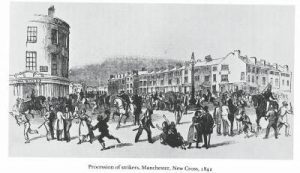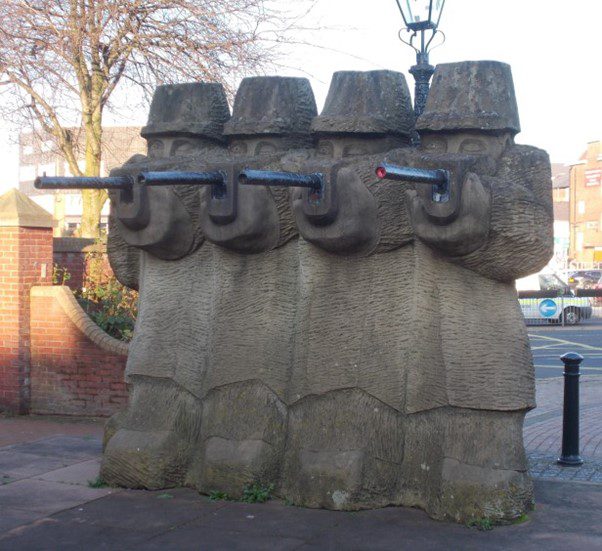25% cuts in wages: bread prices rising: most workers not allowed to vote
By the age of 8 Elizabeth was not only growing up in the radical city of Manchester but riots were rocking the country. There were the Plug Riots of 1842, where men unplugged drains to mill boilers, and bread riots were also widespread. These early memories of anger against political decisions that raised prices and lowered wages would stay with her.
The Corn Laws introduced duties on foreign imports. The Government’s aim was to protect British landowners. The result was high prices of bread for workers who were facing cuts in wages or unemployment.
Elizabeth’s family actively supported the radical politics, and she grew up hearing strong arguments against such Government policies. In 1842 her Aunt Mary took her into Manchester and they got drawn into a crowd of over a thousand angry people demanding the repeal of the Corn Laws[1]. Success at last, and in 1848 the whole family were there to celebrate the achievements of the Anti-Corn Law League. Words and personal experiences from childhood that she recalled years later.
Similar events were playing out across the Pennines. A few weeks after the celebration of the repeal of the Corn Laws in 1848 Elizabeth would be off to school at Fulneck, near Pudsey in Leeds. They had seen plenty of trouble over the years and so talk would still be rife about the day the Riot Act was read at the Bankhouse Mill, just along the track from the Fulneck settlement.
In 1842, when the Plug Riots were at their height, the Bankhouse Mill was hit. The military and a magistrate marched out from Pudsey to read the Riot Act. This was met by one brave man bearing his chest and saying no more work would be done while people starved due to unjust laws.
The determination of the rioters saw off the military, who retired with stones thrown at them for their troubles. Rev James Lang, of Fulneck Moravian Church, recalled in his memoirs that the anger of the rioters dissipated when the bakery and shop in Fulneck opened their doors and fed them[2].
Such events and stories definitely had a strong influence on the young Elizabeth. Many years later, in 1886, she was addressing the Congleton Free Trade Lodge and spoke about her memories of the riots in Manchester. Even though this was forty years later, it is clear that she remembered the events vividly. No doubt so did many of those listening to her that night in Congleton, by then her home town for many years.

Image from the time of the Plug Riots
https://www.wcml.org.uk/our-collections/protest-politics-and-campaigning-for-change/general-strikes/
[1] Wright, Maureen(2009)”An Impudent Intrusion?’ Assessing the Life of Elizabeth Wolstenholme Elmy, First-Wave Feminist and Social Reformer (1833-1918)’,Women’s History Review,18:2,243 — 264.
[2] An event described at the Fulneck Open Heritage Day, 2021. Thanks to Sr Myra Dickinson.


It is fascinating to think of the events that were occurring around her childhood years, it is easy to see on reflection how her passions were formed and why she felt so driven to effect change and why, when the challenges almost impossible, she pushed on relentlessly.